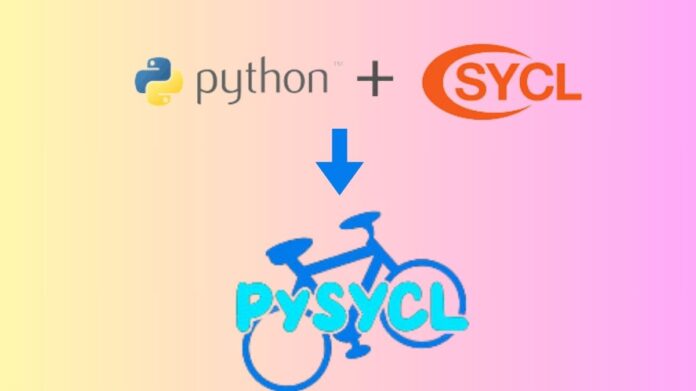The PySYCL
The Python programming language is widely used by developers in many different domains, the most important ones being AI/ML, Data Science, and Analytics. With the aid of many Python libraries devoted to various facets of workloads including numerical computations, data processing, data visualization, model training and inference, and more, developing practical applications in these domains becomes noticeably simpler and faster. What if the SYCL framework could optimize your Python applications for smooth operation on hardware accelerators such as GPUs and FPGAs? Osman El-Ghotmi, an Intel oneAPI Innovator, created the open-source PySYCL project as one such solution that enables Python programs to take advantage of SYCL’s heterogeneous computing features.
The PySYCL Project: A Summary
Concerning PySYCL
With the help of PySYCL, an open-source Python interface for SYCL, Python programs can take advantage of SYCL-based features for heterogeneous computing. PySYCL is a numerical library designed to make Python programming easier and more efficient for hardware accelerators. It attempts to abstract away the complexity of GPU programming. Accessibility to the sizable Python community and progress toward smooth interaction with well-known Python libraries, such numpy, matplotlib, and pytorch, are two advantages of PySYCL.
A numerical package called PySYCL offers a Python interface for SYCL programming. Its smooth interaction with well-known Python libraries, including NumPy, Matplotlib, and PyTorch, helps these libraries operate more quickly and allows for vendor-neutral parallel processing across a variety of hardware architectures. By utilizing the complete range of platform components, CPUs, GPUs, and accelerators, you may expand your Python program to many configurations with ease and distribute it widely.
Target GPUs
With PySYCL, Python programmers can create code that runs on hardware accelerators like FPGAs, GPUs, and other SYCL-compliant devices.
Syntax in Python
In order for Python projects and applications to seamlessly integrate and take use of the usage of GPUs in their current codebase, PySYCL attempts to provide a familiar Pythonic syntax.
Accelerate Your Coding
Python programmers may significantly speed up the numerical algorithms in their codebase by using this.
Basic Modules
It makes it easier to parallelize Python code by offering easy-to-use modules that users can import into their Python projects.
For what reason PySYCL?
The following are some intriguing aspects of PySYCL:
- PySYCL adheres to a syntax that is similar to that of Python. This facilitates the use of the library’s power with familiar syntax by the large community of Python developers.
- Numerical computations are accelerated: PySYCL’s integrated SYCL capabilities allow you to greatly speed up numerical methods within the Python codebase.
- straightforward modules that are straightforward to integrate into Python programs for parallel programming are provided by PySYCL.
- It leverages hardware accelerators by removing the complexity associated with GPU programming. In addition to the SYCL framework’s ability to target CPUs, GPUs, FPGAs, and other hardware accelerators, it offers an intuitive Python interface.
Get to Know PySYCL Better
GitHub has the installation instructions for the PySYCL library step-by-step.
The project offers thorough modules for a range of numerical operations, including matrix operations, vector math, linear algebra, and the Fast Fourier Transform (FFT). The PySYCL user guide contains documentation for the reference code of every module. Additionally, you may view all of the modules’ source codes and example implementations on GitHub.
Developers should study the PySYCL developer guide if they want to learn everything there is to know about the project’s modules, namespaces, classes, and files and/or if they want to contribute to the codebase.
About the Intel oneAPI Innovator
Osman El-Ghotmi is an Intel Innovator who is presently enrolled in the University of Ottawa in Canada to pursue a Master of Applied Science degree. He is the principal developer and original contributor of the PySYCL project. His research group at the University of Ottawa also uses SYCL to solve hyperbolic PDEs (partial differential equations) on heterogeneous infrastructures.
Summary
This program is for developers who work with Intel architecture and use oneAPI. Through their efforts, knowledge, and advocacy, they inspire and lead the global developer community in technical matters. Acknowledgment as a oneAPI specialist, chances for event assistance, project spotlights, and further benefits are offered.
Advantages
- Exclusive access to the oneAPI ecosystem’s Intel experts
- Acknowledgment as a oneAPI specialist and engagements with peers in the community and Intel
- Free usage of premium features on Intel Developer Cloud, a platform for creating Applications using the newest Intel technology
- Invitation to special monthly training sessions and lectures
- Possibility of conference and event reimbursementProjects can be highlighted through DevSummits, articles, demos, and more.
Who is An oneAPI Innovator?
- Experts in technology and development who create and disseminate original concepts to the community
- Enthusiasts inside the oneAPI ecosystem who willingly instruct, mentor, and upliftothers
- New software developers for ongoing or upcoming projects built on oneAPI
What an Innovator Needs?
Proven Expertise in a single API
Applicants should actively participate in a relevant project or ongoing activity to demonstrate their oneAPI knowledge.
Qualifications for Education
This position requires a suitable degree.
Special Invitation to Doctorate Candidates
This chance is given to PhD candidates who demonstrate mastery of one API.


